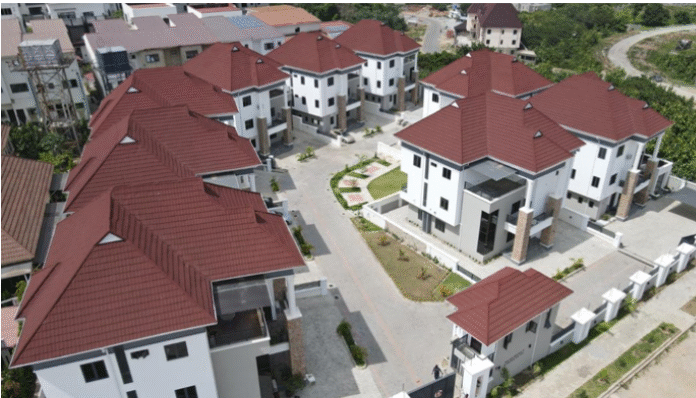The Nigeria’s real estate sector is said to currently account for a substantially larger portion of the country’s GDP, increasing from 12.4 percent of total GDP to 15.9 percent.
Statistician General of the Federation, Mr. Semiu Adeniran
made this disclosure in Abuja while addressing Stakeholders during the ongoing African International Housing Show (AIHS), with the theme: ‘Re-imagining housing through innovation, collaboration and policy’.
He asserted that there is urgent need to rethink Africa’s housing landscape with fresh ideas, strong partnerships, and effective public policy.
Adeniran underscored the significance of reliable data as it guides policy formulation, fosters investor confidence, and supports sustainable solutions to the housing challenges on our continent.
He said, “The housing sector acts as a cornerstone of economic development, creating jobs in construction, manufacturing, retail, finance, and beyond, while directly improving the quality of life for millions of Nigerians.
“With the recent release of the results of the rebasing of Nigeria’s GDP, we have achieved a more comprehensive understanding of our economy, with the reference year having shifted to incorporate emerging sectors and capture recent economic dynamics, including the growing importance of real estate and housing within our national output.
“The rebased GDP figures reveal that the real estate sector now accounts for 10.7%, up from 6.2%, while the construction sector now accounts for 5.2% of total GDP.
“Combined, both sectors account for a substantially larger portion of Nigeria’s GDP, increasing from 12.4% of total GDP to 15.9%. While this 3.5 percentage points increase may seem like a small increase, in value terms, we are talking about N14.6 trillion naira increase.
“This is highly significant by any measure and reflects the expansion of housing activities, from urban development to infrastructure projects, underscoring the sector’s growing influence on national growth. Construction 4.2%, Real estate 7% – 2024.
The Statistician General of the Federation noted the growth in the real estate sector, which essentially involves the buying and selling of properties, including the management of the facilities, outpaced several traditional industries, contributing not only to GDP, but also to employment, innovation, and value addition across supply chains.
He said the sector now ranked as the 3rd largest contributor to total GDP, overtaking Crude Oil and Natural Gas, due to the heavy involvement of informal operators in this economic activity.
“Nigeria’s population has surpassed 200 million, with projections indicating continued rapid growth. The United Nations estimated that by 2050, Nigeria will be the third most populous country in the world, resulting in an exponential increase in housing demand.
“Urbanisation trends are accelerating—over half of the Nigerian population is expected to reside in urban centres within the next decade, fuelled by migration, youth demographics, and changing lifestyles. This urban influx intensifies the pressure on the existing housing stock and creates tremendous opportunities for new developments.
“Access to affordable housing, be it in terms of ownership or rent, is natural human desire and development objective. This is enshrined in the Sustainable Development Goal 11 (SDG11) of the global developmental agenda, which deals with ensuring access for all to adequate, safe, and affordable housing and basic services and upgrade of slums by 2030.
“Available data indicates that only 38.2% of urban dwellers own the houses they live in, making over 60% of those living in the urban areas so not own the properties they live in. This not only highlights the need for more housing but also underscores the significant opportunities and demand in the rental market.
“Investment in housing and construction generates powerful multiplier effects, stimulating demand for materials such as cement, steel, glass, tiles, and providing livelihoods for millions in manufacturing, trade, and professional services.
“Given these new realities in the housing space, the demand and opportunities that exist within the sector. The need for more granular and sector-specific data on housing, real estate, and construction is now more apparent than ever.
“Till now, the available data on housing have been generated through general household or firm-level surveys, where only little information on the sector is collected, analysed, and reported. With the increased contribution and relevance of the sector, more investment is needed to produce the data required to maximise the potential and exploit the opportunities within the sector.”
Adeniran said.

